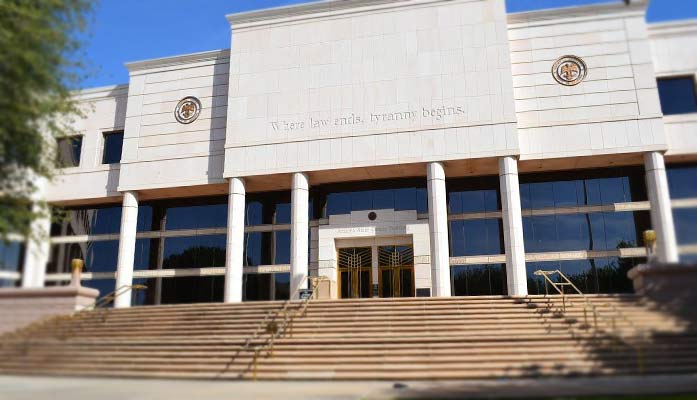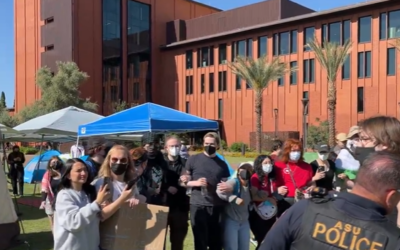By Corinne Murdock |
On Tuesday, the Arizona Supreme Court held oral arguments on the state’s two conflicting abortion bans in the case Planned Parenthood et al v. Kristin Mayes/Hazelrigg.
The court is determining the fate of two conflicting laws: the total abortion ban outlawing all but life-saving abortions, in existence prior to Arizona achieving statehood with versions dating back to Arizona’s first laws as a territory in 1864, and the 2022 ban restricting abortions to 15 weeks’ gestation except in cases of medical emergency. The latter law was codified just months before the Supreme Court overturned Roe v. Wade in Dobbs v. Jackson Women’s Health Organization.
Arizona Attorney General Kris Mayes, who has refused to defend the pre-statehood ban, declared the day before the oral arguments that the ban would relegate Arizonans to a lesser, premodern society.
“Arizonans cannot be shoved back to the 1860s,” said Mayes.
Gov. Katie Hobbs encouraged voters to sign the ballot petition to legalize all abortion up to birth.
Stepping up to defend the pre-statehood ban in Mayes’ stead and first to speak during Tuesday’s oral arguments was Jake Warner, an attorney with the Scottsdale-based conservative Christian legal organization, Alliance Defending Freedom (ADF).
Warner proposed that a certain continuity exists between the pre-statehood ban, which the court referred to as the “territorial law,” and the 2022 ban limiting abortions to 15 weeks’ gestation.
Per Warner, the pre-statehood ban imposes a certain authority on the 2022 statute: all abortions prior to 15 weeks must be life-saving, and that abortions after 15 weeks must not only be life-saving but based on a medical emergency. Warner said that the language of the 2022 statute gave express direction to give deference to the pre-statehood ban.
Chief Justice Robert Brutinel and Vice Chief Justice Ann Timmer didn’t appear convinced of the argument. The pair indicated that physicians would be confused by the two statutes.
On the subject of ectopic pregnancies — an oft-referenced terminal condition in the abortion debate — Warner said that physicians wouldn’t be punished for their removal, since ectopic pregnancies constitute a medical emergency and their removal constitutes a life-saving measure.
Warner said that the 2022 restriction doesn’t repeal the pre-statehood abortion ban, because it created no new right to an abortion. Brutinel posited that the legislative intent with the newer law was to legalize abortion up to 15 weeks’ gestation. Warner countered that the legislature’s intent with its 2022 restriction was to ensure that it protected unborn life to the greatest extent possible.
Justice Clint Bolick questioned how the current law doesn’t conflict with the territorial ban, challenging the implication that something that wasn’t able to be prosecuted prior to Dobbs could now be prosecuted. Likewise, Brutinel said that a physician couldn’t have been prosecuted for conducting abortions under the new law. Warner responded that the language of the 2022 statute only purports to regulate terminations after 15 weeks, not before.
Counsel for Planned Parenthood Arizona, Andy Gaona, argued that the state legislature has displayed a progressive permissiveness when it comes to allowable abortions. Gaona stopped short of declaring the existence of a right to abortion at the outset of his arguments, but did declare, repeatedly, that abortion constituted a form of health care in closing.
“We have never maintained the right to an abortion exists,” said Gaona. “Abortion is health care. I’m not sure anyone has ever said that in this courtroom.”
Contrary to what Warner posited, Gaona argued that the 2022 law allows abortions up to 15 weeks without prosecutions, citing the previous court of appeals decision. Timmer asked whether the state legislature would need to declare a right to an abortion in order to permit that interpretation; Gaona responded that the legislature only needs to regulate criminal conduct to do so, arguing that criminal laws allow that which they don’t criminalize.
Bolick pointed out the 2022 law specifically referenced the territorial law in its construction:
“This act does not […] Repeal, by implication or otherwise, section 13-3603, Arizona Revised Statutes, or any other applicable state law regulating or restricting abortion,” stated the provision.
Gaona disagreed. He said that the court of appeals’ harmonization of the statutes didn’t repeal the pre-statehood law, even by removing prosecution, because the 2022 law now qualifies as the criminal prohibition for elective abortions. Gaona clarified that a physician couldn’t be prosecuted under the territorial statute, but could under the 2022 law if they conduct abortions after 15 weeks.
Gaona argued that a series of statutes that aren’t self-referential or fail to include language repealing an old statute qualify as an implied repeal. Gaona said that if the legislature’s intent was to resurrect the pre-statehood ban, it should’ve stated that clearly “and it clearly didn’t do that.”
Corinne Murdock is a reporter for AZ Free News. Follow her latest on Twitter, or email tips to corinne@azfreenews.com.








